|
News of the World phone hacking scandal:
A wake-up call to the world's media
By Pramod DE SILVA
The closure of a newspaper, any newspaper, is a sad event in a
democracy. It means one less voice for the masses. But sometimes, the
closure of a newspaper is inevitable. A number of newspapers has folded
recently due to financial constraints and the emergence of new media.
Some have even gone web/iPad only.
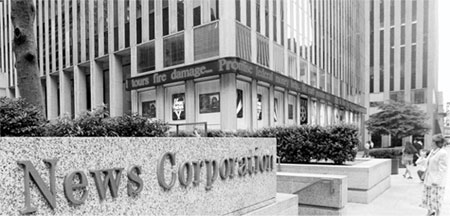 |
|
News Corporation
headquarters and the final edition of News of the World |
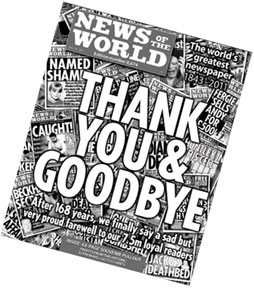 But the recent closure of the 168-year-old News of the World of
Britain was not due to financial reasons. It was one of the biggest
selling newspapers in the country and there was no lack of
advertisements either. But certain unethical practices of the newspaper,
which no one could condone, led to its closure by its owner, media baron
Rupert Murdoch. But the recent closure of the 168-year-old News of the World of
Britain was not due to financial reasons. It was one of the biggest
selling newspapers in the country and there was no lack of
advertisements either. But certain unethical practices of the newspaper,
which no one could condone, led to its closure by its owner, media baron
Rupert Murdoch.
The scandal exploded after it was reported that the News of the World
had hacked the mobile phone of 13-year-old murder victim Milly Dowler in
2002 while her family and police were desperately searching for her.
News of the World operatives reportedly deleted some messages from the
phone's voicemail, giving the girl's parents false hope that she was
still alive.
This ignited public outrage far beyond any previous reaction to press
intrusion into the lives of politicians and celebrities, which the paper
has acknowledged and for which it had paid compensation to some victims.
Revelations that News of the World paid police for information added
fuel to the fire. In the end, there was only one viable option for the
Murdochs: closing the mass-circulation newspaper.
This is exactly what James Murdoch, Rupert’s son and Chief Executive
of News Corporation (which owns News of the World, The Sun, Times,
Sunday Times and Wall Street Journal) said on the closure of the News of
the World: “When I tell people why I am proud to be part of News
Corporation, I say that our commitment to journalism and a free press
are things that sets us apart. Your work is a credit to this. 'The good
things the News of the World does, however, have been sullied by
behaviour that was wrong. Indeed, if recent allegations are true, it was
inhuman and has no place in our company. 'The News of the World was in
the business of holding others to account. But it failed when it came to
itself.
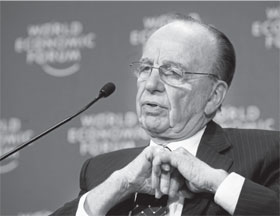 |
|
Rupert Murdoch |
"Just as I acknowledge we have made mistakes, I hope you and everyone
inside and outside the company will acknowledge that we are doing our
utmost to fix them, atone for them, and make sure they never happen
again.”
Invasion into lives
In a later testimony, Rupert Murdoch said: “This is the most humble
day of my career. To all the victims of phone hacking, apologising
cannot take back what has happened. I want them to know the depth of my
regret for the invasions into their lives, and I will work tirelessly
for their forgiveness.”
The Guardian was one of the first newspapers to reveal the sordid
activities of the News of the World. It all began in 2007, when News of
the World royal editor Clive Goodman and private investigator Glenn
Mulcaire were convicted of a conspiracy to hack into phone voice mails
of royals and jailed. Andy Coulson, the paper's editor, claimed to be
unaware of hacking. In June 2008, News Group newspapers paid a £700,000
settlement to soccer executive Gordon Taylor, whose phone was hacked by
Mulcaire.
In September 2010, former News of the World journalist Sean Hoare
alleged that phone hacking was a common practice at the paper and was
encouraged by Coulson, who later became Prime Minister David Cameron’s
spokesman. On January 21, 2011, Coulson resigned as Cameron's spokesman
because of coverage of the phone-hacking scandal. Also on January 26,
London's Metropolitan Police launched a new investigation on voice mail
hacking allegations at News of the World.
On April 5, News of the World chief reporter Neville Thurlbeck and
former editor Ian Edmondson were arrested on suspicion of intercepting
voice mail messages. But it was only on April 10 that the News of the
World officially apologised for hacking into voice mails from 2004 to
2006 and set up a compensation system for unnamed victims. A few days
later, senior News of the World journalist James Weatherup was arrested
on suspicion of conspiracy to intercept communications. Freelance
journalist Terenia Taras was also arrested on suspicion of phone hacking
on June 23.
 |
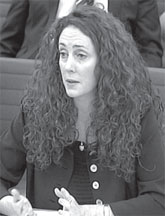 |
| James Murdoch |
Rebekah Brooks |
On July 4, it was revealed that News of the World journalists
possibly hacked into then-missing teenager Milly Dowler's voice mail and
deleted messages to free space, causing her parents to believe she was
still alive. It was also disclosed that phones of families of dead
soldiers had been hacked. In addition to a number of arrests that
followed the phone hacking revelations, the controversial Chief
Executive of News International Rebekah Brooks also resigned.
Meanwhile, Sean Hoare was found dead at his home in Watford last
week. Police say they found no evidence of foul play.
The closure of the newspaper has not ended the controversy. Rupert
Murdoch had to abandon his US$ 12.5 billion bid to completely take over
the satellite broadcaster BSkyB. It has also been pointed out that
Ofcom, the UK broadcast regulator, has the power to revoke BSkyB's
licence should it rule that executives are not "fit and proper" to hold
it.
Questions have been raised over whether the other, more prestigious
titles of News Corp also engaged in the same (phone hacking) practice.
It has also been questioned whether it is appropriate for one company,
virtually controlled by one person, to operate so many media
institutions around the world and become so powerful.
Several other issues have been raised in the wake of the phone
hacking scandal. The intense competition between media outlets has led
to a no-holds barred approach to finding news, preferably sensational
ones. The truth (and usually the privacy of individuals) often become a
casualty of this race to be the first.
Journalists are more likely to employ dubious methods to find their
story, a story that the competitors do not get their hands on. True, the
public do have an appetite for sensational stories and the whole tabloid
newspaper industry caters to this demand often at the expense of
journalistic ethics. In fact, in November 2005 News of the World printed
a story about Prince William injuring his knee, prompting royal
officials to complain to police about probable voice mail hacking. The
developments concerning the Rupert Murdoch news empire has again brought
into focus the need for all newspapers to follow journalistic codes of
conduct.
Greater regulation
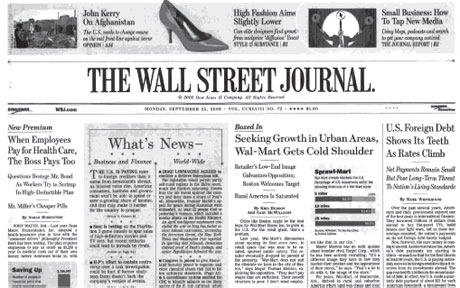 |
|
Another
newspaper in the News Corporation group |
Another development is that the incident has sparked calls for
greater regulation of the media industry by regulatory bodies or by
governments themselves. The media has the responsibility of not misusing
media freedom. In England, Prime Minister Cameron has initiated an
inquiry which has been asked to make recommendations for "a new, more
effective policy and regulatory regime which supports the integrity and
freedom of the press, the plurality of the media and its independence
while encouraging the highest ethical and professional standards". The
relationship between the media, media personnel, police and politicians
has also come under scrutiny in the UK following the scandal.
However, the traditional media are not the only challenge in this
context: there are many citizen journalism sites and social media on the
web, which often beat the regular press at their own game. Whether it is
possible to regulate these, is a moot point.
But the media landscape will never be the same again, not just in the
UK but also globally after the News of the World scandal. There are
growing calls for more transparency on the part of the media, which
usually demand the same from governments.
The press is the guardian of society that exposes the truth, but it
should not be at the expense of other values that we cherish in a
democracy. A free media is a must for any vibrant democracy and they
must uphold impeccable standards at all times.
|

